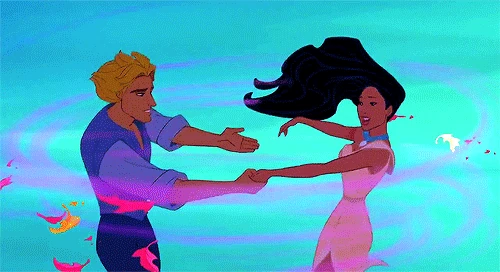Historical Accuracy in Disney Films
As we watch Disney films that bring up important questions of gender and race, we naturally start to wonder—how much should these films be altered to appeal to a child audience, especially when so many of the stories Disney tells revolve around violent times in history? Movies such as Pocahontas, which depict the antagonistic relations between Native Americans and European settlers, dance around the more bloody aspects of history, much to some people's anger.
As for me? I tend to think Disney can do whatever they want as far as picking which parts of history to put in a movie. There's two important reasons for this: 1). Disney's responsibility is to entertain, not to educate, and 2). What parents of a six-year-old are going to let their child see a G-rated movie filled with massacres?
On the first point: Yes, Disney has a certain responsibility to promote social progression. That's why it's bad (and rightfully so) for Disney to include elements of racism, sexism, etc. in their films. Even though the company doesn't have to provide a history lesson in each of its movies, it is obligated to not raise a generation of close-minded, stereotyping individuals. But this does not mean every little thing in every movie has to be perfectly accurate. Disney movies are known to be fiction—and magical fairytale fiction at that. It's not as if the company is promoting its movies as historical fact. So when Disney chooses to leave out the massacres in Pocahontas or other less-appealing historical elements in other movies, it's not because the producers are being jerks. It's because they have an image to protect: a magical, happily-ever-after Disney.
 |
| Yes, this is part of Disney's "happily-ever-after", which happens to contradict history. |
For example, if Disney were to end Pocahontas "historically accurately", most if not all of the characters would be dead, blood would be spilled on all sides, and it would be impossible to end in song and dance and animal friends as every Disney movie does. That's not Disney picking around the unsatisfactory elements of history—that's just Disney doing what Disney does best.
This leads me to my second point. Returning to the Pocahontas example, if Disney were to show this total bloodshed, no parents would let their kids into the theatre. It would defeat the whole purpose of a children's movie. When I was five or six I definitely didn't know about the brutal wars between the Native Americans and English settlers, and rightfully so it wasn't Disney responsibility to educate me. Even in school, I was only making hand turkeys and learning about The First Thanksgiving.
Disney doesn't just leave out the racially sensitive aspects of their Disney movies. They leave out anything mildly unpleasant that took place in history. I don't see lions eating antelopes in The Lion King. Why? Because that would distress children, and that's not Disney's intent. Similarly, Disney only did what it had to in order to leave out the less appealing parts of history in movies like Pocahontas.
So should Disney be taking these true stories and adapting them if they aren't going to be faithful to the plot? That's a whole different conversation. Maybe the producers should just start inventing their own stories instead of relying on those that have already been told. Either way, though, they can't be blamed for not being completely historically accurate—it would go against everything Disney.

Comments
Post a Comment